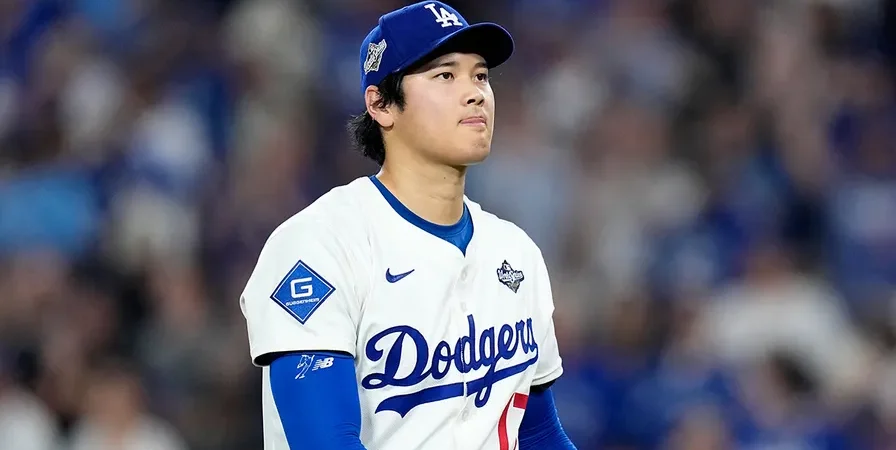When the Los Angeles Dodgers lifted the 2025 World Series trophy under the dazzling lights of Dodger Stadium, fireworks filled the sky, tears filled the eyes of millions, and a city’s dream finally came true. Yet, while the world celebrated the glory of victory, Shohei Ohtani was quietly sitting in the locker room, his hands still trembling, his eyes filled not with pride, but with reflection. As champagne bottles popped around him, Ohtani picked up a notebook and a pen. And in that silence — amid the echoes of joy and chaos — he began to write.
It wasn’t a press statement or a social media post about triumph. It was a letter. A deeply personal, emotional letter addressed to one man — his father, Toru Ohtani, the person who had shaped his soul long before he became the two-way phenomenon the world adores today. Hours later, when he shared it online, the message broke every language barrier, every fan rivalry, every distance between hearts. The words became a mirror that reflected not just Shohei’s gratitude, but the story of every child who once looked at their father and whispered, “I want to be like you.”
The letter began with a line that already carried the weight of tears:
“Before you taught me to throw, you taught me to stand.”
It was simple. But it hit like a home run straight into the hearts of millions. In those few words, Ohtani reminded the world that greatness doesn’t start with talent — it starts with character. And that character, for him, had a name: his father.
Shohei went on to describe the early mornings in Oshu, Iwate Prefecture, when his father would wake him up before dawn to practice. “It wasn’t about winning,” he wrote, “it was about learning to love the work, even when no one was watching.” He recalled the smell of the grass, the sound of his father’s old glove, and the sting of the ball hitting his palm on cold mornings when the world was still asleep. “You never praised me for the perfect pitch,” he wrote. “You praised me when I didn’t give up.”
Each sentence carried a rhythm that wasn’t just literary — it was spiritual. The letter wasn’t a celebration of success; it was a confession of humility. “When I first dreamed of being a professional,” Ohtani wrote, “you told me not to dream of fame — dream of mastery. Because fame fades, but mastery stays with you until your last breath.”
By the time he reached the final lines, readers around the world were already sharing screenshots of the letter with captions like “This is why we love Shohei” and “A champion with the heart of a son.” The Japanese version of his post was translated into dozens of languages within hours, flooding news feeds and sports networks alike.
Then came the most emotional passage — the part that made even seasoned journalists tear up:
“You were never in the stands, never shouting my name, never chasing the cameras. You stayed behind, working in silence, letting me shine in the light you built for me. Tonight, I carried your shadow to the mound — and that’s where I found my strength.”
It wasn’t a statement of arrogance. It was an expression of truth — the kind that only those who have endured struggle can fully understand. Shohei’s father, a former amateur baseball player himself, had always remained quietly in the background, avoiding interviews, rarely attending public events. But those who knew the Ohtani family said his father’s discipline and humility defined Shohei’s entire worldview.
When reporters asked Shohei during the post-game press conference about his decision to post the letter, he smiled softly. “Baseball gave me the world,” he said, “but my father gave me baseball.”
The silence that followed said everything. There were no further questions — just quiet applause from the room.
Back in Japan, the reaction was overwhelming. News anchors read excerpts of the letter live on television. Fans gathered outside Ohtani’s childhood baseball field in Oshu, leaving letters, flowers, and handwritten messages that read, “Thank you for raising him.” The mayor of Oshu even announced plans to commemorate Shohei’s World Series victory by naming a new youth baseball field after his father.
Social media exploded. Hashtags like #ThankYouToruOhtani, #ShoheiAndFather, and #LetterOfGratitude topped trends worldwide. Fans from every corner — from Los Angeles to Tokyo — shared their own stories of their fathers, coaches, mentors, and people who had pushed them to become better. Ohtani’s letter, in its quiet sincerity, had triggered something far beyond baseball: it had reminded people of where dreams begin — at home.
But there was one moment that no one expected. Late into the night, Shohei posted one more photo: his World Series ring, placed beside his father’s old glove — cracked, worn, and patched with tape. The caption read:
“From your glove to my ring — we did it.”
That single image shattered the internet. Thousands commented that they hadn’t cried this much since Ohtani’s signing day or his first home run in the majors. Many said they could almost feel the invisible thread connecting a small boy in northern Japan to the greatest baseball player on the planet.

Inside the Dodgers’ organization, teammates and coaches spoke openly about the letter. Manager Dave Roberts said, “That’s Shohei. He wins the biggest championship of his life and the first thing he thinks about is gratitude.” Freddie Freeman added, “He reminds us that no matter how high you go, you don’t forget where you came from.”
Even rival players from the Toronto Blue Jays, whom the Dodgers defeated in the World Series, shared their respect. Vladimir Guerrero Jr. posted: “Shohei doesn’t just play baseball. He plays from the heart. Much respect, champ.”
In the following days, journalists across the globe began referring to the letter as “The Heart of the World Series.” It was printed in full by The Japan Times, The Los Angeles Times, Marca, and L’Équipe, all praising Ohtani’s humility as the rare essence that keeps sport noble.
And perhaps the most touching response came not from the media, but from Shohei’s father himself. Toru Ohtani, a man who rarely speaks to reporters, released a brief note through a local newspaper:
“I don’t deserve his words. I only taught him to try again when he failed. The rest, he learned from life.
That humble reply perfectly mirrored the spirit of the son — modest, grateful, profound.
By the time the Dodgers’ championship parade began in downtown Los Angeles, thousands of fans carried signs that read “Thank you, Mr. Ohtani” alongside Japanese flags and baseball gloves. When Shohei rode past, he didn’t raise his fist or shout to the crowd. Instead, he bowed — a simple, elegant gesture that spoke louder than anything else.
Underneath all the fame, the endorsements, and the records, Shohei Ohtani remains what he has always been: a son who never forgot where he came from, a man who still believes that gratitude is the purest form of greatness.
And in that letter — written with a trembling hand and a full heart — he reminded the entire world that championships are won not just with strength, but with love.



